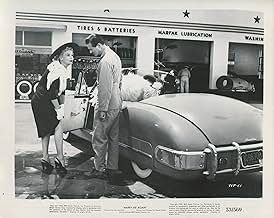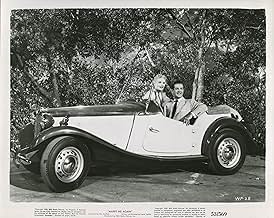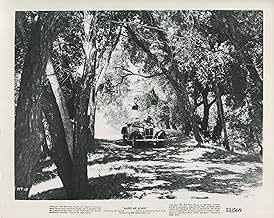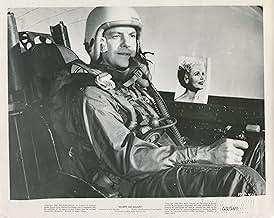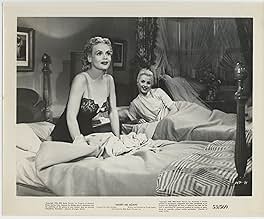A pilot discharged from the Korean War is disappointed to discover that his fiancée has since become independently wealthy thanks to a $1 million inheritance.A pilot discharged from the Korean War is disappointed to discover that his fiancée has since become independently wealthy thanks to a $1 million inheritance.A pilot discharged from the Korean War is disappointed to discover that his fiancée has since become independently wealthy thanks to a $1 million inheritance.
George Chandler
- Telegram Messenger
- (uncredited)
Marjorie Stapp
- W.A.C.
- (uncredited)
- Director
- Writers
- All cast & crew
- Production, box office & more at IMDbPro
Storyline
Did you know
- TriviaMary Costa's debut.
Featured review
Comedy director Frank Tashlin followed up his immensely popular and hilarious Technicolor western spoof, SON OF PALEFACE (1952), with MARRY ME AGAIN, a low-budget, black-and-white, unfunny farce about Bill Anderson (Robert Cummings), a Korean war hero who walks away from his wedding after he learns his bride-to-be has just inherited a million dollars. She had kept the windfall quiet because her fiancé had made a point only a day earlier at his welcome-home ceremony—over the radio no less—of insisting that he was to be the breadwinner for the family and that his wife would stay in the kitchen where she belonged. So we're supposed to feel sympathy for an obvious fool who doesn't recognize a good thing when he's got it. And it's not helped by the casting of Marie Wilson as Doris, the wife-to-be, played by Wilson in full "My Friend Irma" mode, a ditzy blonde character she'd played on the radio and in two movies with Jerry Lewis and Dean Martin (a team that Tashlin would direct to better effect in two films later in the decade). Wilson's Gracie Allen-style clueless act was getting tired by this point.
Granted, women were expected to stay home and raise families back then, but there's a desperate quality to Anderson's initial insecurity, even before learning of the inheritance, about letting his wife work as a secretary earning $75 a week when he will be returning to his gas station job at $65 a week. The ultimate resolution satisfies all parties and amounts to a happy ending, with a touch of then-relevant social conscience related to housing for veterans thrown in, but it never erases our uneasy feeling about Bill and his kneejerk insistence on denying Doris the right to what's hers.
There are attempts to create cartoon-style gags throughout the film, a specialty of Tashlin, a onetime director of some of the best Warner Bros. Looney Tunes. But none of these are particularly funny. E.g. during the hero's ticker tape parade through the San Fernando Valley (a locale conspicuously lacking the necessary multi-story buildings from which to throw ticker tape), Doris gets covered in confetti like a mummy. That's it. There's a fight at a theater during a 3-D movie that could have been developed and milked for more laughs. On the day of the wedding, there's a drunk scene in which the camera is focused entirely in a long take on the feet of two of the main characters as they get drunk at a bar and one of the men loses his shoe and puts his stocking foot into his fallen hat in order to walk out of the bar. That's the level of humor here. (A far cry from Bob Hope's bedroom scene with Trigger in SON OF PALEFACE.)
It's got a lackluster cast headed by future sitcom star Robert Cummings as the war hero/would-be groom and few supporting actors of note. Mary Costa, a pretty performer with some comic talent, plays Doris' best friend Joan, but was more famous as a singer ("Hollywood Palace"). (She was also Mrs. Frank Tashlin.) Her husband, Bill's friend and employer, is played by Ray Walker, who generally played bit parts and did a lot of television. Venerable character player Moroni Olsen appears as the crooked inheritance lawyer and the icily attractive June Vincent plays his partner/mistress, yet they are both underused and their potential threat to Doris' inheritance is never adequately developed. They're the ones who inexplicably alert the media to Doris' inheritance, despite her expressed wish to avoid that, and there's some farcical value in the way the local media (TV, radio, newspapers) broadcast the news widely yet fail to reach Anderson who misses the story all the way to the wedding. It's a situation ripe for laughs, yet it's never fully exploited.
Tashlin did much better work with Bugs Bunny ("The Unruly Hare"); Porky Pig and Daffy Duck ("Porky Pig's Feat"); Dick Powell and Debbie Reynolds (SUSAN SLEPT HERE); Dean Martin and Jerry Lewis (ARTISTS AND MODELS); Jerry Lewis solo (CINDERFELLA, WHO'S MINDING THE STORE?); Bob Hope (SON OF PALEFACE); Tom Ewell and Jayne Mansfield (THE GIRL CAN'T HELP IT); and Tony Randall and Jayne Mansfield WILL SUCCESS SPOIL ROCK HUNTER?). I guess you can't win 'em all.
Happy Valentine's Day.
Granted, women were expected to stay home and raise families back then, but there's a desperate quality to Anderson's initial insecurity, even before learning of the inheritance, about letting his wife work as a secretary earning $75 a week when he will be returning to his gas station job at $65 a week. The ultimate resolution satisfies all parties and amounts to a happy ending, with a touch of then-relevant social conscience related to housing for veterans thrown in, but it never erases our uneasy feeling about Bill and his kneejerk insistence on denying Doris the right to what's hers.
There are attempts to create cartoon-style gags throughout the film, a specialty of Tashlin, a onetime director of some of the best Warner Bros. Looney Tunes. But none of these are particularly funny. E.g. during the hero's ticker tape parade through the San Fernando Valley (a locale conspicuously lacking the necessary multi-story buildings from which to throw ticker tape), Doris gets covered in confetti like a mummy. That's it. There's a fight at a theater during a 3-D movie that could have been developed and milked for more laughs. On the day of the wedding, there's a drunk scene in which the camera is focused entirely in a long take on the feet of two of the main characters as they get drunk at a bar and one of the men loses his shoe and puts his stocking foot into his fallen hat in order to walk out of the bar. That's the level of humor here. (A far cry from Bob Hope's bedroom scene with Trigger in SON OF PALEFACE.)
It's got a lackluster cast headed by future sitcom star Robert Cummings as the war hero/would-be groom and few supporting actors of note. Mary Costa, a pretty performer with some comic talent, plays Doris' best friend Joan, but was more famous as a singer ("Hollywood Palace"). (She was also Mrs. Frank Tashlin.) Her husband, Bill's friend and employer, is played by Ray Walker, who generally played bit parts and did a lot of television. Venerable character player Moroni Olsen appears as the crooked inheritance lawyer and the icily attractive June Vincent plays his partner/mistress, yet they are both underused and their potential threat to Doris' inheritance is never adequately developed. They're the ones who inexplicably alert the media to Doris' inheritance, despite her expressed wish to avoid that, and there's some farcical value in the way the local media (TV, radio, newspapers) broadcast the news widely yet fail to reach Anderson who misses the story all the way to the wedding. It's a situation ripe for laughs, yet it's never fully exploited.
Tashlin did much better work with Bugs Bunny ("The Unruly Hare"); Porky Pig and Daffy Duck ("Porky Pig's Feat"); Dick Powell and Debbie Reynolds (SUSAN SLEPT HERE); Dean Martin and Jerry Lewis (ARTISTS AND MODELS); Jerry Lewis solo (CINDERFELLA, WHO'S MINDING THE STORE?); Bob Hope (SON OF PALEFACE); Tom Ewell and Jayne Mansfield (THE GIRL CAN'T HELP IT); and Tony Randall and Jayne Mansfield WILL SUCCESS SPOIL ROCK HUNTER?). I guess you can't win 'em all.
Happy Valentine's Day.
- BrianDanaCamp
- Feb 13, 2010
- Permalink
Details
- Runtime1 hour 13 minutes
- Color
- Aspect ratio
- 1.66 : 1
Contribute to this page
Suggest an edit or add missing content


